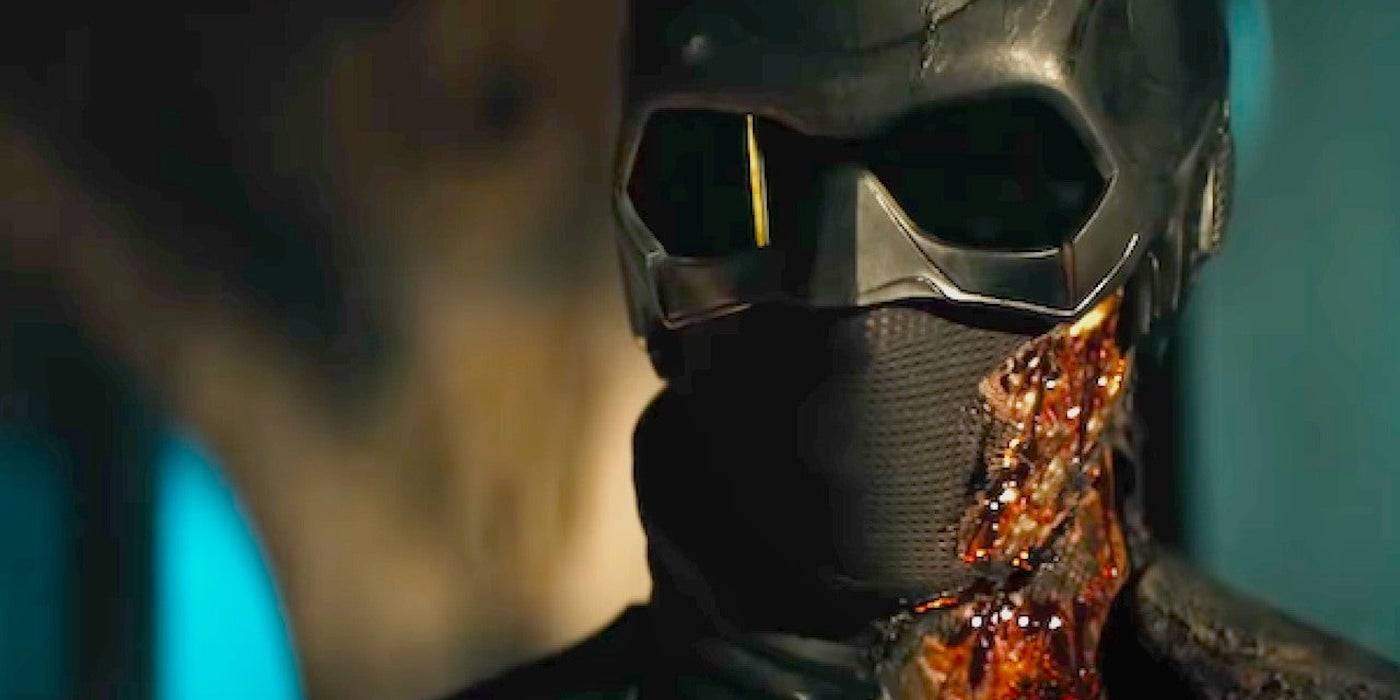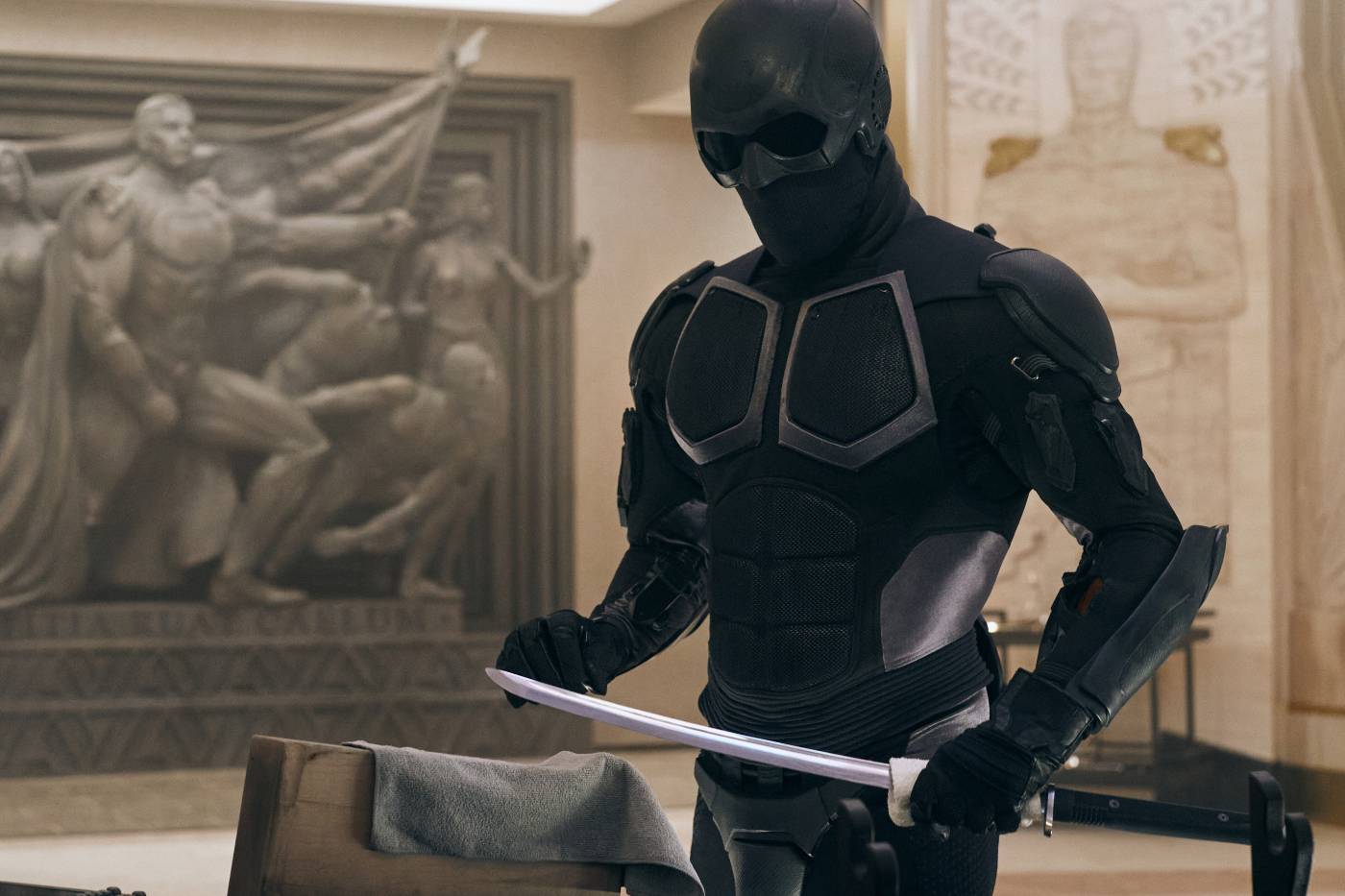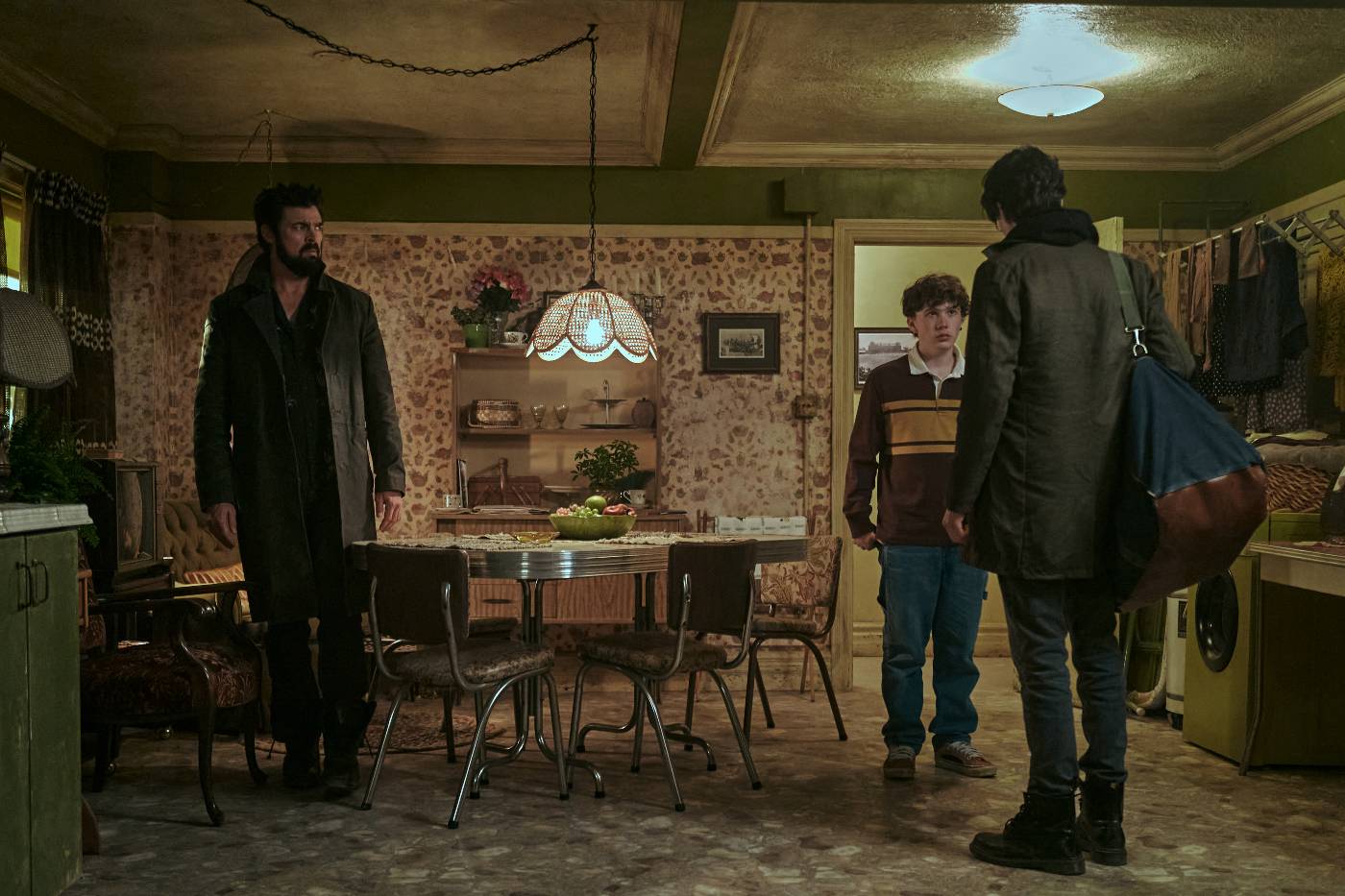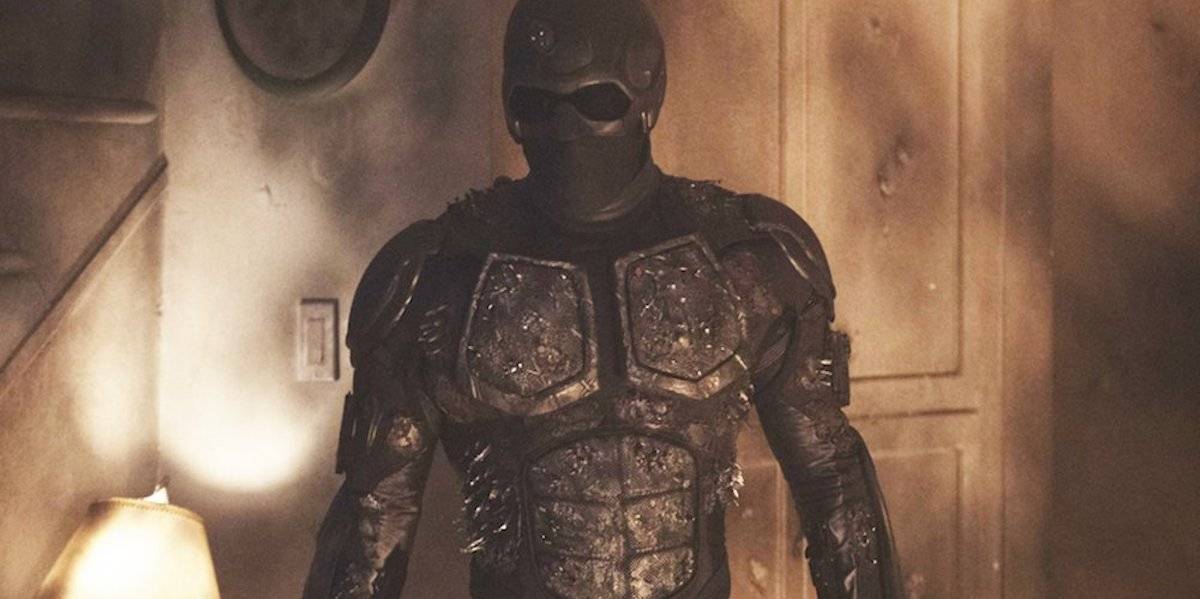Black Noir Has the Most Compelling Arc of 'The Boys' Season 3
Tuesday, July 5, 2022
Add Comment
Throughout the first three seasons of The Boys, we’ve gotten to know the members of The Seven quite well. Some we didn’t get to spend much time with (rest in peace Translucent, Lamplighter, and Supersonic) and others we’ve gotten to know intimately like Homelander (Antony Starr), Queen Maeve (Dominique McElligott), and Starlight (Erin Moriarty). However, one member has remained in the shadows: no backstory, no real name, no associations or known life outside The Seven, only Black Noir (Nathan Mitchell). A founding member of Vought’s Seven, Black Noir has been around for quite a long time, predating Homelander. Since the show's genesis, Noir has been a silent but intimidating force in The Seven and a formidable opponent for the boys. Usually found right behind Homelander, not much is known about Vought’s mysterious ‘hero’.
So far The Boys has provided very few breadcrumbs about Black Noir. He is mute, hideously scarred under his mask, a lethal fighter, and deathly allergic to almonds. We also learned earlier in season three that Noir was a member of a superhero team known as ‘Payback’, led by Soldier Boy (Jensen Ackles) in the '80s. However, Episode 7, "Here Comes a Candle to Light You to Bed" provides the most information yet on Black Noir’s history. And as can be expected from The Boys, it’s quite brutal.
Following the news of Soldier Boy’s return, Black Noir gruesomely carves his tracking chip out of his arm with one of his several knives and flees Seven Tower. While his mask covers his face, it’s clear Black Noir is feeling a certain type of terror he hasn’t felt in a long time. Episode seven finds him holed up in a location that clearly holds some nostalgia for him: Buster Beaver’s Pizza Restaurant. The barren and abandoned Chuck E. Cheese knockoff isn’t the first place you’d expect a ruthless, stone-cold killer like Noir to hide. It’s actually quite the juxtaposition but proves effective in relaying Noir’s buried trauma.
Reminiscent of a scene from 2016’s Deadpool that merges gritty live-action with childish animation, Black Noir finds himself comforted by an assortment of animated critters from the Buster Beaver franchise. An empathetic Buster Beaver (Eric Bauza) comforts Noir, reminding him of past experiences that they’ve helped him through before but also warns him he can’t avoid his conflict with Soldier Boy forever. Buster Beaver refers to Noir as Earving, providing confirmation of his real name, a fact that helps humanize Black Noir as he is escorted by the critters to an old stage. While it is shown there is visibly nothing onstage, through Noir’s eyes we see a past memory uniquely reimagined. Unlike previous flashbacks from Season 3, the flashbacks at Buster Beaver’s are animated and the characters are anthropomorphic animals.
While the cheery colors and cartoony animation style brighten the memory, there is no sugar-coating Black Noir’s past. Quite literally characterized by a black sheep, a young Black Noir confronts a muscular eagle representative of Soldier Boy. We learn through this conversation that Earving is pursuing acting on the side of his Payback role and was up for the part of Axel Foley in Beverly Hills Cop. However, he loses the part because Eagle Soldier Boy sabotaged his chances by badmouthing Earving to producer Don Simpson. Black Sheep Noir is outraged with Eagle Soldier Boy, who bluntly tells Noir he wasn’t good enough. Eagle Soldier Boy turns his back to end the conversation but Noir grabs him in protest. Before a single word is exchanged, Eagle Soldier Boy whips around and punches Black Sheep Noir square in the face.
A deafening crunch is heard as we see the present-day Black Noir wince in pain from the memory. It’s visceral and real, not even the cartoony animation can help the brutality of the scene. Eagle Soldier Boy lands punch after punch on Black Sheep Noir as blood flies everywhere. It’s on the ground. It’s on Black Sheep Noir’s nose, chin, and chest. It’s on Eagle Soldier Boy’s beak. Through the cries of protest from the rest of the anthropomorphized Payback team, Eagle Soldier Boy tells a quivering, broken Black Sheep Noir that he will never amount to anything, that he is nothing.
The traumatic animation is intercut with present-day Black Noir’s reaction, framed solely in close-up, and it is utterly heartbreaking. Brilliantly performed by Mitchell, his subtle tilt of the head, moving forward in agony, and back again in submission is all the movement needed to convey the emotional totality of the scene. It also explains Payback’s (specifically Black Noir’s) motive for their stand against Soldier Boy in Nicaragua and his subsequent disappearance.
Back in animation, an offer is proposed by a meerkat version of Stan Edgar. He encourages Black Sheep Noir to off Soldier Boy as a means for Vought to usher in a new, bigger, better, shinier hero they have been working on, Homelander, who at the time is still just a child. While Black Noir jumps at the opportunity to end the abuse he’s suffered under Soldier Boy, he lacks the foresight to see he is simply trading one bad situation for another.
When Meerkat Stan Edgar (Giancarlo Esposito) offers Black Sheep Noir the opportunity to end Soldier Boy in Nicaragua, he is eating almonds. Eventually, Noir makes a comment, bringing the snack to the audience’s attention, asking Edgar to stop eating the almonds in front of him, as he is allergic. Instead of listening or apologizing, Meerkat Edgar replies with a dead stare and an even larger crunch of his cartoonishly large almonds. Edgar's dismissal of Noir's serious health concern serves as a chilling foreshadowing of Noir’s future. He is going to receive the exact same abusive and manipulative treatment under Stan Edgar that he did with Soldier Boy. He will live only to remain under Vought’s thumb, finding himself in a subordinate position once more working under his former protege.
Sitting alone at Buster Beaver’s Pizza Place, it has to be sinking in for Black Noir: Soldier Boy was right all those years ago. The horrible reality of the situation is he never escaped the abuse. He didn’t make a name for himself. No Earving, only Black Noir. He barks when he’s told to, hoop jumps when he has to, and listens to his owner. Sure, he’s silent and lethal. But even more so, he is silent and complacent.
In Black Noir’s defense, he didn’t have much of a choice. As Black Noir’s continued memory reveals, the attack on Soldier Boy, while ultimately successful, brings only more tragedy upon Noir. Scooping him off his feet, Eagle Soldier Boy, slams Black Sheep Noir into the hood of a burning car and repeatedly bashes his head in with his shield. The animation does not hold back, depicting the entirety of the assault. Black Sheep Noir’s eyes bulge, his scalp burns off, and he loses chunks of his brain. The mask Earving once wanted to ditch, was now an absolute necessity and his only option for social acceptance. Condemned to his supersuit, Earving would never be anything more than his mask.
Suddenly it all makes sense: The silence, the lack of emotion, the ruthless, inhuman persona. Black Noir used to be a person with heart, emotions, and dreams but it was stripped away by Soldier Boy in a matter of seconds. In such a short amount of time, The Boys has crafted the most poignant arc of the series. Building curiosity about the character since the show's release and slowly revealing bits of information has led to an extremely satisfying, albeit guttural reveal of who Black Noir used to be. While it isn’t as extensive as the arcs written for Butcher (Karl Urban), Hughie (Jack Quaid), or Homelander, the flashbacks of Noir’s history this past season have been just as substantial, arguably even more.
Similar to Starlight and Queen Maeve, Black Noir has seemingly come to his wit's end with Vought. The company’s hold over its talent is wearing thinner by the minute and the facade of The Seven is crumbling member by member. Annie has finally spoken out against Vought publicly, Maeve has been imprisoned for conspiring against Homelander, and Black Noir has seemingly decided to take control of his life again. However, while Annie and Maeve are out for Homelander’s blood, Black Noir has a different path to follow.
The jarring cliff-hanger of Episode 7 teases a confrontation between Soldier Boy and Homelander, who has been revealed to be the former’s son. While this will likely be the title fight of the finale, it shouldn’t distract from the conflict growing between Soldier Boy and Black Noir. The man responsible for Black Noir’s eternal suffering and silent solitude has returned, thirsting for revenge against his former team. The Buster Beaver critter’s speaking on behalf of Black Noir reveals that he is a sensitive person deep down and that he is scared. His fear and shame emanate through his mask, through the slight droop of his head. But Black Noir knows he has to face Soldier Boy again. He doesn’t have much to lose and that’s exactly why he needs to fight. His opponent took everything from him and the least Noir can do is gain the closure he desires.
Black Noir’s arc feels so compelling primarily due to its scarcity throughout the last two seasons. Nothing was known about the character until suddenly, after years of theorizing, the audience is overwhelmed with all of the answers in addition to an abundance of emotions and morality to process. Should one feel empathy for Black Noir? Does his past trauma justify the crimes he’s committed and the lives he’s taken? Does he even deserve to be called anything other than Black Noir? Is he a redeemable character? The questions are endless and no real answer presents itself, but if one thing is certain it’s that Black Noir has a lot of emotional baggage to unpack as he earns his spot among the pantheon of certified dynamic characters in television.





0 Response to "Black Noir Has the Most Compelling Arc of 'The Boys' Season 3"
Post a Comment